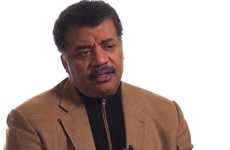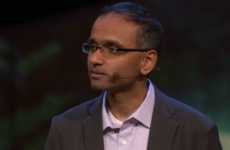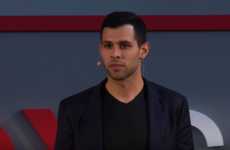
Need Inspiration?
Get inspired by 4,000+ keynote speaker videos & our founder, a top keynote speaker on innovation.
Stephen Webb's Keynote on Extraterrestrial Life is Fascinating
Kalin Ned — August 1, 2018 — Keynote Trends
References: stephenwebb.info & ted
It is perhaps Stephen Webb's love for science fiction that motivated him to complete a Ph.D. in theoretical particle physics and deliver a keynote on extraterrestrial life. Although his talk is purely speculative, it channels a deeply seeded curiosity in all of us that can only be satisfied with an answer to the question: Is there intelligent life outside of our planet?
The keynote on extraterrestrial life begins with the weighing of possibilities — is it more likely that you saw an alien spacecraft or did your brain misinterpret visual stimuli? Different theories fill the void of the uncertainty — from an unknown civilization that colonized the galaxy and seeded Earth with life to the well-discussed skeptical scenario that humanity lives in an artificial simulation. The speculations are imaginative, vast and many. After all, the universe is estimated to be about 13.8 billion years old. Is it possible that humanity is the only intelligent species?
The numbers and rate of probabilities would point to a negative answer, however, Stephen Webb proposes a series of barriers that need to be considered when addressing this estimate. Traditionally, these include the habitability of the planet, the abiogenesis, the development of technological civilization and the ability of communication across space. During his keynote on extraterrestrial life, Stephen Webb adds additional barriers to consider in the development of a civilization — climate stability, successful evolution, the capability of understanding the universe and the avoidance of disaster.
Ultimately, the talk ends with the Rare Earth Hypothesis, which is a theory that points that the origin of life on our planet required an improbable and an incredibly unique combination of astrophysical and geological events and circumstances. In a sense, the extremely fascinating keynote on extraterrestrial life celebrates humanity's success in overcoming those barriers and indirectly advocates for the importance of looking after our home and recognizing how fortunate we are.
The keynote on extraterrestrial life begins with the weighing of possibilities — is it more likely that you saw an alien spacecraft or did your brain misinterpret visual stimuli? Different theories fill the void of the uncertainty — from an unknown civilization that colonized the galaxy and seeded Earth with life to the well-discussed skeptical scenario that humanity lives in an artificial simulation. The speculations are imaginative, vast and many. After all, the universe is estimated to be about 13.8 billion years old. Is it possible that humanity is the only intelligent species?
The numbers and rate of probabilities would point to a negative answer, however, Stephen Webb proposes a series of barriers that need to be considered when addressing this estimate. Traditionally, these include the habitability of the planet, the abiogenesis, the development of technological civilization and the ability of communication across space. During his keynote on extraterrestrial life, Stephen Webb adds additional barriers to consider in the development of a civilization — climate stability, successful evolution, the capability of understanding the universe and the avoidance of disaster.
Ultimately, the talk ends with the Rare Earth Hypothesis, which is a theory that points that the origin of life on our planet required an improbable and an incredibly unique combination of astrophysical and geological events and circumstances. In a sense, the extremely fascinating keynote on extraterrestrial life celebrates humanity's success in overcoming those barriers and indirectly advocates for the importance of looking after our home and recognizing how fortunate we are.
2.8
Score
Popularity
Activity
Freshness
















